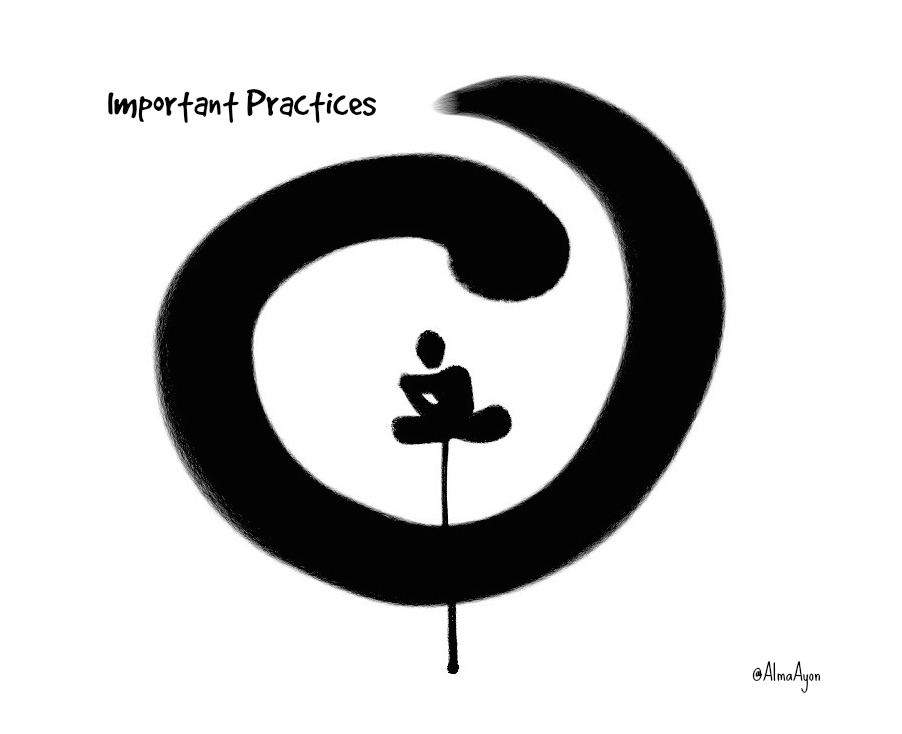by Alma Ayon | Sep 12, 2017 | reflections
Have you ever felt motivated to do a project that at the time seemed very significant, or get involved in a job or activity that would be of much benefit to others? But as you started to develop it, you started to face the obstacles that come with any type of business or project?. You realized that in order to do that, you had to fight tirelessly, to do things that were unpleasant and that required money and effort and that there was no guarantee of success, not even knowing if it would really benefit humanity.
You questioned whether your motivation behind this project was not in some way also dominated by some self-centered desire, to get recognition, or money, or some kind of personal benefit. You met people who opposed or discouraged you, telling you that it was not worth investing your time, or that it was not a good idea nor a useful project.
Little by little you felt more and more discouraged, less motivated, and finally decided that it was not worth putting more time and energy into that project. You finally quited. And you started to wonder what's really worthwhile?
I have been there, and the only thing I have found worthwhile is to watch my mind closely, to see how thoughts arise that crystallize into motivations, motivations that produce emotions that feed the energy that leads to action. Be aware, what is your motivation behind each action?. And when you discover that it's a self-centered motivation, ask yourself if it's really worthwhile.
Reflecting on our actions, becoming aware of our motivations, emotions and thoughts, is what really is worth, only in this way we begin to know ourselves, to become better people, more attentive, kind, generous and patient, and when we are dedicated to this observation and transformation we can begin to act wisely, effortlessly and selflessly. Action happens in a natural way. And when there is no necessary action, the stillness of our body, whether in the sitting position or in the supine posture, allows us to continue to observe our mind, in the present, releasing the clinging to the past and to the future.
What is it really worthwhile for you?
by Alma Ayon | Aug 25, 2017 | meditations, reflections
Our motivation is what determines whether our meditation practice is a superficial patch to relieve some stress and relax us, or if it is a deeper practice that can lead us to completely free ourselves from dissatisfaction, pain, fear and discover genuine happiness. Moreover, our motivation may be so great that it leads us to practice meditation not only for our own benefit but also for that of others.
I recommend reading the article where I talk about how to structure your meditation session. Thus, when we sit down to meditate we spend the first 1 to 5 minutes of our practice reflecting on the motivation for which we meditate, trying to be honest with ourselves. We reflect on how important it is to train our minds to change habits, to cultivate attention and concentration and to free ourselves from mental afflictions. Think of the benefits of training your mind in attention and wisdom and cultivating emotional and mental balance. Think that your formal sessions are equivalent to going to the gym but in this case what you are training is the mind. And reflect on the positive effects of practicing daily. Thus we are motivated to practice properly.
Reflect on how valuable it is to have health, free time and desire to train your mind, and appreciate every moment in which you can sit and meditate, because you don't know when disease, old age and death will come. Determine to take advantage of every moment, living in the present with a calm and attentive mind, cultivating a good heart and developing your wisdom.
At the end of our meditation, we commit to continue to be attentive to the motivations that move us to think, speak and act in a certain way. As we become more aware of why we do everything we do, we will realize what the motivations behind our actions are, and gradually we will realize that when we have selfish and self-centered motivations, we will be generating problems and suffering for ourselves and others. So little by little our main motivation will be to make ourselves and others happy.
by Alma Ayon | Aug 21, 2017 | reflections
Do not let your days go by while you are only doing what is urgent or what others expect of you.
Start by defining what you would like to achieve and receive from the world.
Then reflect on how you would use these things or qualities to become the best version of yourself. What kind of person would you like to be? What qualities and talents would you like to develop?
Now reflect on how this new version of yourself could help others and how it could impact the world for good.
Define the direction you want to give your life and start walking in that direction today.
Do not let anything distract you, stop doing what is not important, stop checking your email every 5 minutes and reading all the gossip on Facebook.
Use every minute to transform your mind into a happy, peaceful mind and to help other beings.
Take the time to walk in the nature while you reflect on whether you are going in the right direction or you have deviated and it is time to return to the path.
Do this meditation on loving-kindness for yourself
by Alma Ayon | Aug 7, 2017 | emotions, wisdom
Our society overestimates productivity, and many people live unhappy by the demand to have to be productive, the consequence of this system is people who get carried away to the extreme of work and stress. Although occupational therapy has its benefits, if we thoroughly analyze the purpose of it, it is to distract the mind with activities and entertainments. On the one hand fulfills its function of removing painful stimuli and focus attention on another activity, but on the other hand it does not allow us to observe the mind and discover its potential to heal, balance and find a happiness that is not based on external stimuli.
Everything in our society is oriented to distract us and entertain us, television, the internet, social gatherings, etc. The consequence of this is that when the human being is alone and without activity that distracts him he begins to become aware of the anxiety, fear, loneliness, depression and other emotions that have been outside the threshold of consciousness while he was distracted. Many can not stand it and run for activities, people and anything that entertains them and distracts them from their great fear: being with themselves, without a stimulus. We have become addicted to activity and this has mental and physical consequences.
As Blaise Pascal (1623-1662) put it: "When I have sometimes set myself to consider the different agitations of men, and the perils and the pains to which they expose themselves in the court, in war, whence arise so many complaints, passions, rash and often wicked enterprises, I have often said that all the misery of man arises from one source, which is, that he cannot remain at rest in a room."
I invite you to learn to be in control of your thoughts and emotions regardless of the circumstance you are in, to train your mind so that you can find peace of mind both in solitude and in company, to become independent. For this I suggest exercises based on mental training and the cultivation of emotional balance. It is to help you direct your attention in a voluntary and sustained way, to teach you to differentiate between reality and the ideas you project about yourself, others and situations, as well as to train your mind to be aware when a destructive emotion begins to emerge, and to be able to release it before entering into the refractory period and have an impulse reaction like that of hurting yourself or others, to help you to cultivate motivations and intentions that guide your life in a constructive direction, as well as the cultivation of empathy for the suffering of others and cultivate equanimity when difficult situations arise in your life, and finally to help you discover that in solitude you can also find peace of mind, clarity and happiness if you learn to observe the flow of thoughts, emotions and mental events that arise, dwell and fade, without clinging to, or identifying with them. Cognitive fusion is the root of the problem and one can be free of it, if one learns to distance oneself from destructive thoughts and emotions.
by Alma Ayon | Jul 20, 2016 | ethics, reflections, wisdom
Today I want to offer you methods and tools with which you can balance different areas of your life; emotional, social, cognitive, etc.
One of the imbalances that we all suffer and yet consider normal is in the attention. Our minds are constantly distracted with thoughts about the past or the future and with an endless inner dialogue. When we are able to stay present and with a silent mind we can concentrate better and experience greater mental clarity. The problem is we do not know how to train our minds to improve attention. Today already in many Western countries are taught the techniques developed in Asia for training this ability.
By being vigilant in the present we can also be aware of thoughts and emotions that we experience habitually and recognize which of those are virtuous and not virtuous. Through methods to develop empathy, compassion, patience, etc. we can also begin to live an ethical life, making us responsible for the impact of our actions and words on others and the environment.
The development of emotional intelligence is crucial as suggested by Daniel Goldman. Since this type of intelligence is leading us to manage our emotions with wisdom and knowledge related to establishing good society, thus opening the doors to reach our goals, to live a meaningful life and bring benefits to our community.
Likewise, the development of wisdom is important for the development of human beings. Not only rational intelligence and emotional, but also a deeper wisdom about the reality of how it is that we exist. Recognizing that we are interdependent with everything around us, that we are impermanent and because of this we can transform ourselves into better people, changing our negative habits and cultivating positive ones. And the wisdom of the awareness that we are going to die and be separated from everything we value and appreciate, which helps us to put our priorities in place and leverage our lives in the best way possible.

